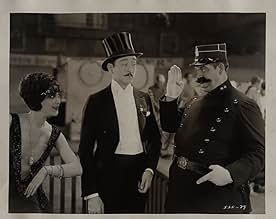Jetta Goudal(1891-1985)
- Actress
Although Dutch-born silent screen femme fatale Jetta Goudal (pronounced
Zhett-eh Goo-doll) may be pretty much forgotten today, she was, in her
glorious Hollywood heyday, a star rivaling that of
Gloria Swanson and fellow vamps
Barbara La Marr and
Nita Naldi. The daughter of a Jewish orthodox
diamond cutter in Amsterdam, she began her career on stage in Europe,
traveling with various theater companies. Arriving in America (New York
City) following the WWI armistice (1918), Juliette (Julie) Henriette
Goudeket purposely disguised her Dutch and Jewish ancestry and her age,
passing herself off as "Jetta Goudal," a Parisienne born in Versailles
in 1901 and the daughter of a lawyer.
She first appeared on Broadway in the drama "The Hero" in March of 1921; that September she returned with the melodrama "The Elton Charm". Eventually testing for film. She attracted immediate attention with her first two small film roles and caught the eye of legendary producer/director Cecil B. DeMille. He hired her for what turned out to be some of her (and his) greatest critical successes, including her emotional roles in The Coming of Amos (1925), The Road to Yesterday (1925), White Gold (1927) and The Forbidden Woman (1927). Unfortunately, the exotic allure and element of mystery that made Goudal so popular on-screen came with a price. She was an unrepentant theatrical "grand dame" and possessed a fierce temper well known to the film community.
Her extreme difficulty on the set led to DeMille breaking her contract, which in turn led Goudal to file a landmark lawsuit against him. She charged him with breach of contract, while he claimed her diva-like tirades over every detail of production, from costumes and scenery to mere entrances, caused a multitude of delays and severe financial setbacks for the studio. Goudal, however, won the suit--one reason being that neither DeMille nor the studio could furnish financial records to back up their claims that she cost them untold thousands of dollars--and it set a precedent regarding actors' rights vs. studios' rights. The damage to her career and reputation, however, was sealed and she never recaptured her former glory. Moreover, with the arrival of sound her very thick French accent left her with limited offers.
Goudal married art director Harold Grieve in 1930 and retired from the screen permanently three years later. Along with her husband, she went into interior design and faded from the Hollywood scene. They had no children. Plagued by health problems (heart condition) in the 1960s, she suffered a serious fall in 1973 which left her an invalid. She died in 1985 and was interred in a private room at the Great Mausoleum, Sanctuary of the Angels, at Forest Lawn Memorial Park Cemetery in Glendale, California. Her devoted husband was interred next to her upon his death in 1993.
She first appeared on Broadway in the drama "The Hero" in March of 1921; that September she returned with the melodrama "The Elton Charm". Eventually testing for film. She attracted immediate attention with her first two small film roles and caught the eye of legendary producer/director Cecil B. DeMille. He hired her for what turned out to be some of her (and his) greatest critical successes, including her emotional roles in The Coming of Amos (1925), The Road to Yesterday (1925), White Gold (1927) and The Forbidden Woman (1927). Unfortunately, the exotic allure and element of mystery that made Goudal so popular on-screen came with a price. She was an unrepentant theatrical "grand dame" and possessed a fierce temper well known to the film community.
Her extreme difficulty on the set led to DeMille breaking her contract, which in turn led Goudal to file a landmark lawsuit against him. She charged him with breach of contract, while he claimed her diva-like tirades over every detail of production, from costumes and scenery to mere entrances, caused a multitude of delays and severe financial setbacks for the studio. Goudal, however, won the suit--one reason being that neither DeMille nor the studio could furnish financial records to back up their claims that she cost them untold thousands of dollars--and it set a precedent regarding actors' rights vs. studios' rights. The damage to her career and reputation, however, was sealed and she never recaptured her former glory. Moreover, with the arrival of sound her very thick French accent left her with limited offers.
Goudal married art director Harold Grieve in 1930 and retired from the screen permanently three years later. Along with her husband, she went into interior design and faded from the Hollywood scene. They had no children. Plagued by health problems (heart condition) in the 1960s, she suffered a serious fall in 1973 which left her an invalid. She died in 1985 and was interred in a private room at the Great Mausoleum, Sanctuary of the Angels, at Forest Lawn Memorial Park Cemetery in Glendale, California. Her devoted husband was interred next to her upon his death in 1993.























